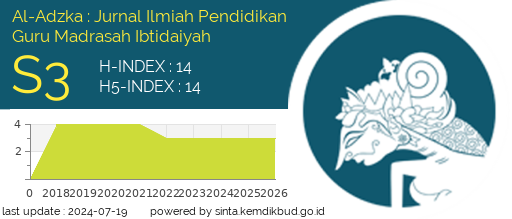ANALISIS KECENDERUNGAN PENELITIAN SKRIPSI MAHASISWA PGMI SEBAGAI REVITALISASI BIDANG KEAHLIAN GURU MI (SUATU PENDEKATAN META-ANALISIS)
DOI:
https://doi.org/10.18592/aladzkapgmi.v4i1.278Keywords:
Thesis Research issues, university students in primary education, MI teacher, expertise, Meta-analysis approachAbstract
Students tend to have a dependence on thesis research issue that has been investigated earlier generation. This dependence if left unchecked will result in less mastered the skills to examine other research themes and less diverse issues of research and limited research themes so that students understand the difficulty of completing the thesis and the resulting increase in student study period. This study aims to identify, analyze and map the results of educational research student during the period of 5 years, from 2009 until July 2013. Study was conducted with the meta-analysis approach and a case study (case study research) with using the instrumental case study design. Based on analysis of student thesis research in primary, concluded: [1] thesis research issues of the most widely studied by students majoring in primary education during the period of 5 years, in terms of aspects: first; Both thesis research subjects; Aspects of the subject / Third thesis research material; Methods / type of study Fourth; Issues in education research thesis [2] thesis research issues that allows for further researched by the students of primary education in the coming period.References
Arikunto, Suharsimi. (2010) .Prosdur Penelitian, Suatu Pendekatan Praktek, Jakarta: Rineka Cipta,
Ary, Donald, dkk. (2007) Pengantar Penelitian dalam Pendidikan, diterj. Arief Furchan, Yogyakarta: Pustaka Pelajar.
Azwar, Saifuddin. (2005) .Metode Penelitian, Yogyakarta: Pustaka Pelajar.
Best, John W., (1982) Metodologi Penelitian Pendidikan, Surabaya:Usaha Nasional.
Danim, Sadaswan, (1997)Metode Penelitian untuk Ilmu-Ilmu Prilaku, Jakarta: Bumi Aksara.
Duit, R.. ( 2007) Science Education Research Internationally: Conception Research Methods, Domain of Research, Eurasia: Journal of Mathematics, Science&Technology Education, 3(1).
Faisal, Sanapiah. (1982) Metodologi Penelitian Pendidikan Surabaya: Usaha Nasional.
Hadi, Sutrisno. (1789)Metode Research I, Yogyakarta: Yayasan Penerbit Fakultas Psikologi UGM.
Hagul, Peter. (1989) Penentuan Variabel Penelitian dan Hubungan Antar Variabel, dalam buku Metode Penelitian Survai, editor Masri Singarimbuan, dkk., Jakarta:LP3ES
Jenkin, E. W., (2001) Research in Science Education in Europe: Retrospect and Prospect. In H. Behrendt, W. Graiber, M. Komorek, A. Kross&P.Reiska, Eds., Research in Science Education-Past, Present, and Future, Dordrecht:Kluwer Academic Publishers.
Moleong, Lexy J. (2007) Metodologi Penelitian Kualitatif, Bandung: Remaja Rosdakarya.
Salman, Sulaiman. (2007) Proposal Penelitian, dalam Metodologi Penelitian Agama (Dasar-Dasar Teoritis dan Aplikasi), Editor: Wahyudin, Banjarmasin: Antasari Press.
Setyosari, Punaji. (2010) Metode Penelitian Pendidikan dan Pengembangan, Jakarta: Kencana Prenada Media Group.
Sugiono. (2009) Metode Penelitian Pendidikan, Pendekatan Kuantitatif, Kualitatif, dan R&D, Bandung:Alfabeta.
Suharto,Ign., dkk., (2004) Perekayasaan Metodologi Penelitian, Yogyakarta: Andi.
Sukardi. (2009) Metodologi Penelitian Pendidikan, Kompetensi dan Prakteknya, Jakarta:Bumi Aksara,
Sukmadinata. (2010) Nana Syaodih, Metode Penelitian Pendidikan, Bandung: Remaja Rosdakarya.
Supramono, dkk., (2005) Desain Proposal Penelitian, Studi Pemasaran, Yogyakarta: Andi.
Strauss, Anselm. (2007) Dasar-Dasar Penelitian Kualitatif, Yogyakarta: Pustaka Pelajar,
Tim Penyusun. (2011)Pedoman Akademik Program Pascasarjana, Banjarmasin : IAIN Antasari.
Pujianto, dkk., (2011) Analisis Kecenderungan dan Tren Penelitian pada Mahasiswa Pendidikan Fisika sebagai Revitalisasi Bidang Keahlian Penunjang Akreditasi: Studi Kasus Prodi Pendidikan Fisika FMIPA UNY, Prosiding Seminar Nasional Sains.
White, R. (1997) Trends in Research in Science Education, Research in Science Education.
Downloads
Published
How to Cite
Issue
Section
License
Copyright (c) 2014 Mila Hasanah

This work is licensed under a Creative Commons Attribution 4.0 International License.
Authors who publish with this journal agree to the following terms:
- Authors retain copyright and grant the journal right of first publication with the work simultaneously licensed under a Creative Commons Attribution 4.0 International that allows others to share the work with an acknowledgement of the work's authorship and initial publication in this journal.
- Authors are able to enter into separate, additional contractual arrangements for the non-exclusive distribution of the journal's published version of the work (e.g., post it to an institutional repository or publish it in a book), with an acknowledgement of its initial publication in this journal.
- Authors are permitted and encouraged to post their work online (e.g., in institutional repositories or on their website) prior to and during the submission process, as it can lead to productive exchanges, as well as earlier and greater citation of published work.








